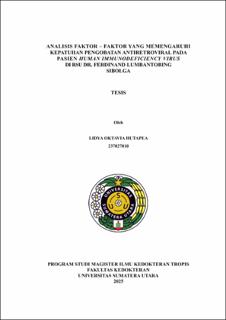Analisis Faktor-Faktor yang Memengaruhi Kepatuhan Pengobatan Antiretroviral pada Pasien Human Immunodeficiency Virus di RSU Dr. Ferdinand Lumbantobing Sibolga
Analysis of Factors Affecting Antiretroviral Treatment Adherence in Human Immunodeficiency Virus Patients at RSU Dr. Ferdinand Lumbantobing Sibolga

Date
2025Author
Hutapea, Lidya Oktavia
Advisor(s)
Widyawati, Tri
Lubis, Rodiah Rahmawaty
Metadata
Show full item recordAbstract
Background. Adherence to antiretroviral therapy (ART) is an important factor in controlling HIV/AIDS and achieving the UNAIDS 95-95-95 targets. Although 76% of people with HIV (PWH) worldwide have received ARV therapy, the active treatment coverage in Indonesia remains low, at only 41%. At RSU Dr. Ferdinand Lumbantobing Sibolga, the optimal adherence rate (≥95%) reached only 50%. This study aims to analyze the factors influencing ARV treatment adherence among HIV patients at the hospital. Methods. This study used a quantitative observational design with a cross-sectional approach from April to December 2024. A total of 88 HIV patients undergoing ARV therapy were selected through total sampling based on inclusion and exclusion criteria. Data were gathered using a set questionnaire and examined with SPSS version 18 using simple, two-variable (chi-square test), and multiple (logistic regression) analysis methods. Results. The majority of respondents were aged ≥30 years (81.8%), married (51.1%), male (60.2%), employed (63.6%), and had experienced treatment side effects (59.1%). Chi-square analysis showed a significant relationship between ARV medication adherence and patient knowledge, perception of ARV, access to healthcare facilities, adherence counseling, as well as support from healthcare workers and family (p < 0.05). Logistic regression results indicated that adherence was significantly influenced by knowledge about the treatment (aOR = 7.845; p < 0.01), family support (aOR = 7.347; p < 0.01), healthcare worker support (aOR = 7.129; p < 0.01), and availability of healthcare facilities (aOR = 3.713; p < 0.05). Conclusion. Adherence to ARV therapy is greatly influenced by patient knowledge, the quality of healthcare services, and support from healthcare workers and family. Efforts to enhance patient education and family involvement need to be prioritized in supporting the success of treatment.
